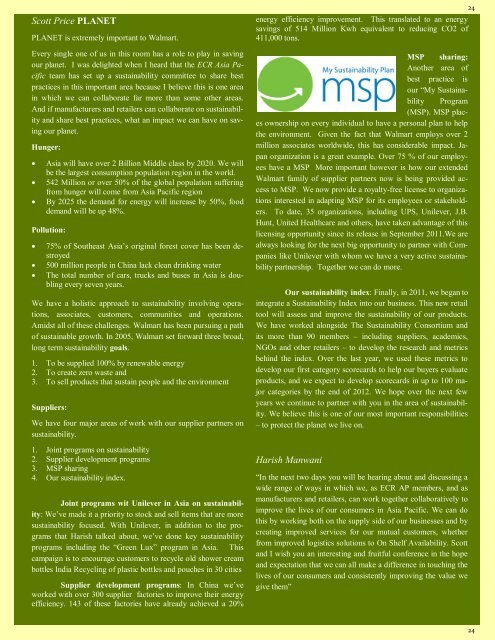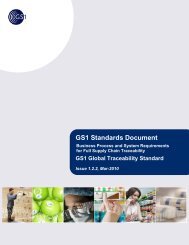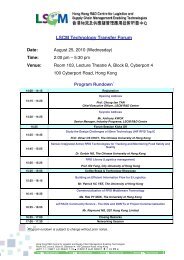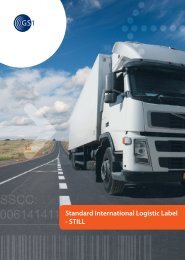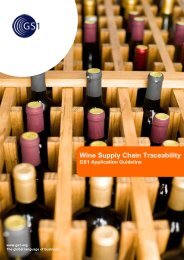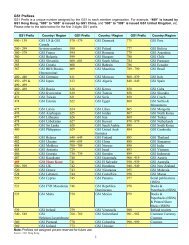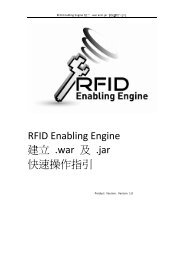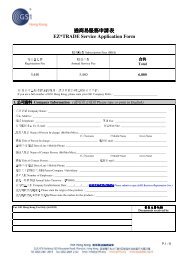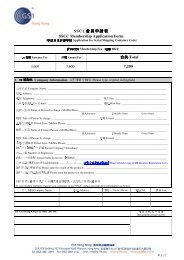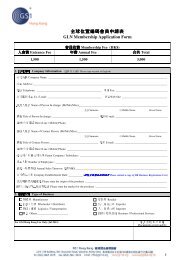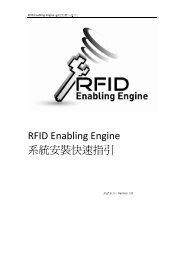ECR AP - GS1 Hong Kong Supply Chain Management
ECR AP - GS1 Hong Kong Supply Chain Management
ECR AP - GS1 Hong Kong Supply Chain Management
Create successful ePaper yourself
Turn your PDF publications into a flip-book with our unique Google optimized e-Paper software.
Scott Price PLANET<br />
PLANET is extremely important to Walmart.<br />
Every single one of us in this room has a role to play in saving<br />
our planet. I was delighted when I heard that the <strong>ECR</strong> Asia Pacific<br />
team has set up a sustainability committee to share best<br />
practices in this important area because I believe this is one area<br />
in which we can collaborate far more than some other areas.<br />
And if manufacturers and retailers can collaborate on sustainability<br />
and share best practices, what an impact we can have on saving<br />
our planet.<br />
Hunger:<br />
<br />
<br />
<br />
Asia will have over 2 Billion Middle class by 2020. We will<br />
be the largest consumption population region in the world.<br />
542 Million or over 50% of the global population suffering<br />
from hunger will come from Asia Pacific region<br />
By 2025 the demand for energy will increase by 50%, food<br />
demand will be up 48%.<br />
Pollution:<br />
<br />
<br />
<br />
75% of Southeast Asia’s original forest cover has been destroyed<br />
500 million people in China lack clean drinking water<br />
The total number of cars, trucks and buses in Asia is doubling<br />
every seven years.<br />
We have a holistic approach to sustainability involving operations,<br />
associates, customers, communities and operations.<br />
Amidst all of these challenges. Walmart has been pursuing a path<br />
of sustainable growth. In 2005, Walmart set forward three broad,<br />
long term sustainability goals.<br />
1. To be supplied 100% by renewable energy<br />
2. To create zero waste and<br />
3. To sell products that sustain people and the environment<br />
Suppliers:<br />
We have four major areas of work with our supplier partners on<br />
sustainability.<br />
1. Joint programs on sustainability<br />
2. Supplier development programs<br />
3. MSP sharing<br />
4. Our sustainability index.<br />
Joint programs wit Unilever in Asia on sustainability:<br />
We’ve made it a priority to stock and sell items that are more<br />
sustainability focused. With Unilever, in addition to the programs<br />
that Harish talked about, we’ve done key sustainability<br />
programs including the “Green Lux” program in Asia. This<br />
campaign is to encourage customers to recycle old shower cream<br />
bottles India Recycling of plastic bottles and pouches in 30 cities<br />
Supplier development programs: In China we’ve<br />
worked with over 300 supplier factories to improve their energy<br />
efficiency. 143 of these factories have already achieved a 20%<br />
energy efficiency improvement. This translated to an energy<br />
savings of 514 Million Kwh equivalent to reducing CO2 of<br />
411,000 tons.<br />
MSP sharing:<br />
Another area of<br />
best practice is<br />
our “My Sustainability<br />
Program<br />
(MSP). MSP places<br />
ownership on every individual to have a personal plan to help<br />
the environment. Given the fact that Walmart employs over 2<br />
million associates worldwide, this has considerable impact. Japan<br />
organization is a great example. Over 75 % of our employees<br />
have a MSP More important however is how our extended<br />
Walmart family of supplier partners now is being provided access<br />
to MSP. We now provide a royalty-free license to organizations<br />
interested in adapting MSP for its employees or stakeholders.<br />
To date, 35 organizations, including UPS, Unilever, J.B.<br />
Hunt, United Healthcare and others, have taken advantage of this<br />
licensing opportunity since its release in September 2011.We are<br />
always looking for the next big opportunity to partner with Companies<br />
like Unilever with whom we have a very active sustainability<br />
partnership. Together we can do more.<br />
Our sustainability index: Finally, in 2011, we began to<br />
integrate a Sustainability Index into our business. This new retail<br />
tool will assess and improve the sustainability of our products.<br />
We have worked alongside The Sustainability Consortium and<br />
its more than 90 members – including suppliers, academics,<br />
NGOs and other retailers – to develop the research and metrics<br />
behind the index. Over the last year, we used these metrics to<br />
develop our first category scorecards to help our buyers evaluate<br />
products, and we expect to develop scorecards in up to 100 major<br />
categories by the end of 2012. We hope over the next few<br />
years we continue to partner with you in the area of sustainability.<br />
We believe this is one of our most important responsibilities<br />
– to protect the planet we live on.<br />
Harish Manwani<br />
“In the next two days you will be hearing about and discussing a<br />
wide range of ways in which we, as <strong>ECR</strong> <strong>AP</strong> members, and as<br />
manufacturers and retailers, can work together collaboratively to<br />
improve the lives of our consumers in Asia Pacific. We can do<br />
this by working both on the supply side of our businesses and by<br />
creating improved services for our mutual customers, whether<br />
from improved logistics solutions to On Shelf Availability. Scott<br />
and I wish you an interesting and fruitful conference in the hope<br />
and expectation that we can all make a difference in touching the<br />
lives of our consumers and consistently improving the value we<br />
give them”<br />
24<br />
24


